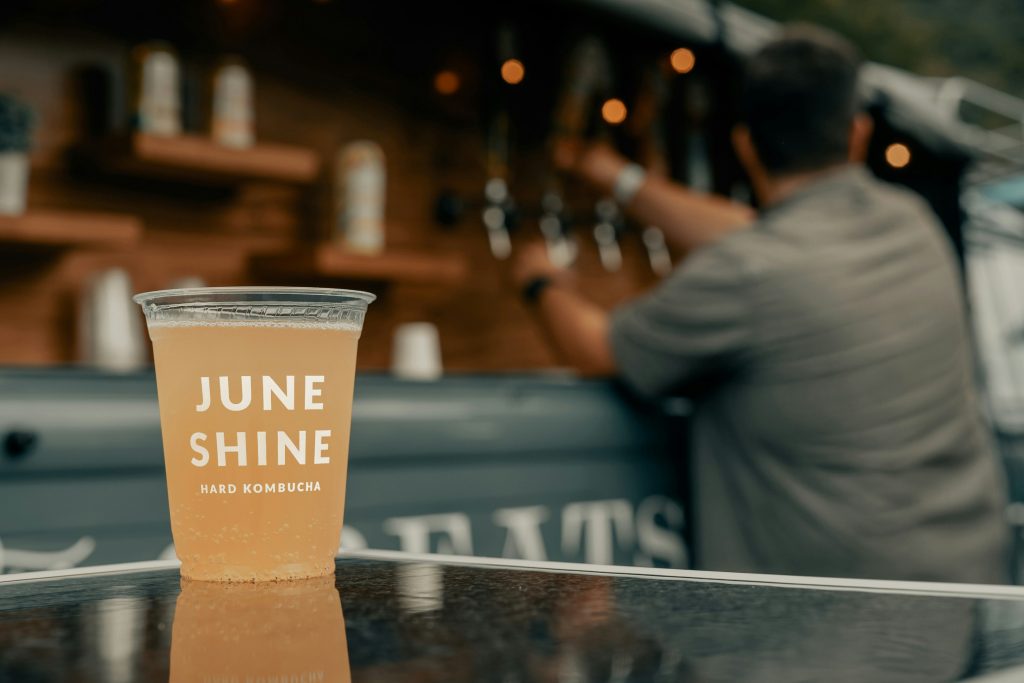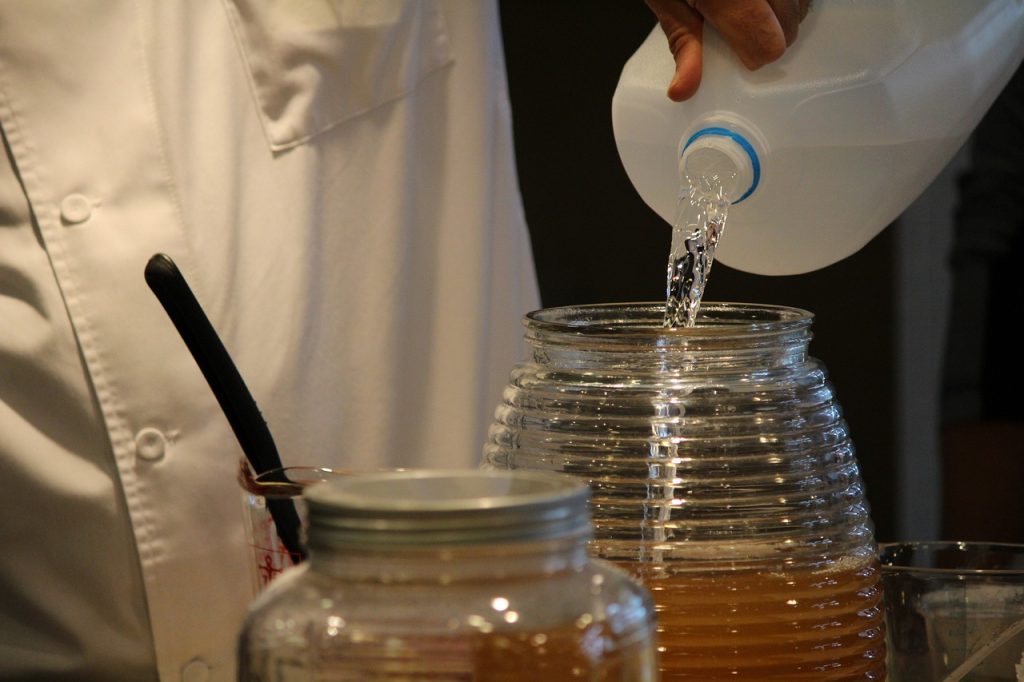Kombucha, a fermented tea beverage with roots dating back over 2,000 years to East Asia, has transformed from a household brew to a global wellness trend. This resurgence is closely tied to the growing consumer interest in fermented foods and beverages, driven by a broader health and wellness movement. Its unique tangy flavor, probiotics, and health benefits have captured the interest of the health-conscious, especially as fermented foods gain popularity. While growing demand for low-sugar kombucha options is prevalent, formulating such products can come with some challenges. Identifying and developing best practices for sugar reduction in kombuchas will be key to progressing the category forward in the future.
The Growth of Kombucha Products
According to Future Market Insights reports from 2023, the global kombucha market size was valued at approximately $3.4 billion and is projected to grow at a compound annual growth rate (CAGR) of 17.4% from 2022 to 2033. The increasing availability of kombucha in grocery stores and cafes further underscores its rise in popularity.
For example, ready-to-drink (RTD) kombucha beverages have become a dominant segment, with innovations extending beyond traditional tea bases. Today, kombucha-infused juices, cocktails, and even skincare products are emerging, tapping into broader wellness and lifestyle trends. These diversified offerings cater to a wide range of consumers, from those seeking gut health benefits to those interested in functional and novel beverage experiences.
Low-Sugar Kombucha Success Stories
Several kombucha brands have successfully achieved sugar reduction while maintaining consumer satisfaction. For example, Health-Ade Kombucha, which boasts a $200 million valuation as of 2023, introduced a line of kombucha using cold-pressed juice and a proprietary blend of natural sweeteners to create a flavorful, satisfying drink with less sugar. Similarly, GT’s Living Foods, a leading kombucha brand with over $275 million in annual sales, offers a “Synergy” line that combines kombucha with fruit juices and botanical extracts, providing a naturally sweetened option with lower sugar content than traditional kombucha. June Shine, known for its hard kombucha, saw its revenue triple in its inaugural year, fueled by its focus on organic ingredients and reducing sugar content, offering a lighter alcoholic beverage that caters to health-conscious consumers seeking flavor and gut-health benefits without the excess sugar.

These products have been well-received by consumers who are increasingly seeking healthier beverage options. For instance, Health-Ade reported a 35% increase in sales after launching its lower-sugar line, while GT’s Synergy drinks remain top sellers in the kombucha category across major retailers. These examples demonstrate that it is possible to reduce sugar in kombucha without compromising on quality or consumer appeal, as market demand continues to push for healthier alternatives.
Kombucha as a Functional Beverage
As consumers become more health-conscious, they are increasingly seeking beverages that contribute to their overall wellness —drinks that offer more than just hydration. At the heart of kombucha’s appeal is its high-probiotic content. Probiotics are beneficial bacteria that play a crucial role in supporting gut health by balancing the gut microbiome, which in turn can enhance digestion and overall well-being. Research from the National Institutes of Health suggests that a healthy gut microbiome can improve nutrient absorption, reduce inflammation, and even influence mental health.
Kombucha is also rich in bioactive compounds such as phenolic acids, polyphenols (e.g., catechins), organic acids, vitamins, and micronutrients. It has great anti-inflammatory, antioxidant, and anticarcinogenic activities, making it a promising alternative for the control and treatment of obesity and its associated comorbidities.
That’s just the start though. Consumption of kombucha has been associated with several health benefits:
- Reduction of oxidative stress and inflammation
- Improve lipid profile
- Anti-carcinogenic properties
- Anti-obesity potential
- Gut microbiota modulation
Achieving Sugar Reduction in Kombucha Formulations
Sugar plays a crucial role in the kombucha fermentation process. It serves as the primary energy source for the SCOBY (Symbiotic Culture of Bacteria and Yeast), enabling it to produce the acids, probiotics, and carbon dioxide that give kombucha its characteristic tartness and effervescence. During fermentation, the yeast in the SCOBY metabolizes the sugar, producing alcohol and carbon dioxide. The bacteria then convert the alcohol into acetic acid and other organic acids, which contribute to kombucha’s tangy flavor and potential health benefits.
Achieving the right balance of sugar is essential. Too much sugar can lead to an overly sweet product, while too little can result in incomplete fermentation, affecting both the flavor and the probiotic content. With the increasing consumer demand for lower-sugar beverages, kombucha producers face the challenge of reducing sugar without compromising the drink’s taste, mouthfeel, or fermentation quality.
Challenges & Solutions for Reducing Sugar
Reducing sugar in kombucha presents several challenges. Lowering the sugar content too much can inhibit the fermentation process, leading to a flat, unbalanced drink that lacks the complexity kombucha is known for. Additionally, sugar contributes to the mouthfeel and body of kombucha, so reducing it can result in a thinner, less satisfying beverage.
Howtian LLC offers innovative solutions for addressing these challenges. Natural sweeteners like stevia and monk fruit are ideal for maintaining the sweetness of kombucha while significantly lowering its sugar content. These sweeteners have minimal impact on the fermentation process and can be used to replace a portion of the sugar without sacrificing flavor or mouthfeel. For product developers, it’s important to carefully balance these sweeteners with traditional sugars to ensure proper fermentation and to use blending techniques that enhance the overall flavor profile.
Formulation Tips
- Recommended Usage Levels: Start at 200ppm of stevia such as Reb A 98, then increase in increments of 50ppm until you achieve your desired sweetness. You can add other fruits and flavors during the second fermentation phase to add additional natural sweetness.
- Blending Techniques: Use a combination of stevia with small amounts of sugar to maintain the body and mouthfeel while reducing overall sugar content.
- Flavor Enhancement: Incorporate natural flavors or fruit extracts to complement the sweetness and mask any aftertaste from non-nutritive sweeteners. Howtian offers a glycosylated stevia that can be labelled as natural flavor when used under 175ppm in beverages, adding the perfect sweet touch.
Innovative Kombucha Applications
Regular store-bought kombucha can contain between 10-12g of sugar per 250ml. To make a sugar-reduced or low-sugar version of kombucha, it is important to understand that sugar is still a vital ingredient for the first fermentation process. Since sugar acts as the source of energy for the yeast and bacteria to feed off of, it cannot be replaced with sugar alternatives such as erythritol, allulose, stevia or monk fruit at this point.
For a sugar-free version you can let the first fermentation go on until all the sugar is used up. What you will be left with is a strong kombucha concentrate that is similar to vinegar. You can then mix this concentrate with water, tea, stevia, and your fruit/herbal infusion of choice. For example, below is a recipe for a sugar-free ginger kombucha:
- 100mL hot water
- 2 ½ tbsp tea
- 700mL cold water
- 200mL kombucha concentrate
- 1-2 tbsp finely chopped ginger
- 0.1900g stevia extract RA98
- 0.1750g natural flavor – SoPure plus
Mix the tea into the hot water, then after thorough infusion, remove the tea leaves and add the rest of the ingredients. Cover in jar or bottle and let it sit room temperature for 24-48 hours. Since there is no additional sugar being added, this second step is mainly for the infusion and is not technically a second fermentation. However, if you want the final product to be more carbonated you can substitute some or all of the cold water for sparkling water.

If you want to make a fruity, sugar-reduced kombucha infusion, you can follow the same ingredients as above but substitute the ginger for ¼ cup of chopped strawberries. You can add other ingredients in the mix such as mint, basil, or rosemary. Since there is additional sugar from the fruit, this counts as a second fermentation and will produce more carbon dioxide in the final product. Make sure the bottle or jar is well sealed to retain the carbonation. This can be left for 48-72 hours to ferment at room temperature before it needs to be moved to a fridge to stop the fermentation.
The amount of sugar in these kombuchas can range from 0-5g per 250ml depending on your fruit infusion of choice. If you would like a more precise way to measure the final sugar content of your kombucha you can use a refractometer, which displays the refractive index in brix.
Besides using the kombucha concentrate to make kombucha, you can also use it as a 1:1 substitute for:
- Vinegar to use in salad dressings, marinades or sauces
- Mixer with red wine to make sangria or with brandy to make fruity cocktails
Innovative Kombucha Applications
As consumers become more environmentally conscious, the demand for sustainably sourced and organic ingredients in kombucha production has grown significantly. Tea leaves, being the foundation of kombucha, are increasingly being sourced from organic farms that prioritize sustainable agricultural practices. This not only ensures a higher quality product free from pesticides and harmful chemicals, but also supports biodiversity and protects ecosystems.
The trend towards sustainability in kombucha production is not just a marketing tactic but a reflection of a deeper consumer interest in products that align with their values. As the kombucha market continues to grow, these practices are likely to become even more integral to brand identity and consumer loyalty.
The kombucha market is constantly evolving, with new innovations emerging that cater to diverse consumer needs. One such trend is the development of kombucha concentrate and kombucha shots, which offer a more potent dose of the drink’s beneficial probiotics and organic acids. These products are often marketed as convenient, on-the-go options for consumers seeking a quick health boost.
Another area of emerging interest is the use of kombucha in beauty and wellness products. The antioxidants and organic acids found in kombucha are being explored for their potential benefits in skincare, leading to the creation of kombucha-based creams, serums, and even shampoos. This crossover into the beauty industry reflects kombucha’s growing reputation as a multifunctional product beyond just a beverage.
Looking ahead, the kombucha market might also see the rise of alcohol-infused kombucha as a popular choice. While kombucha naturally contains a small amount of alcohol due to fermentation, there’s potential for higher-alcohol versions to tap into the craft beverage market. This could appeal to consumers looking for a healthier alternative to traditional alcoholic drinks, combining the benefits of kombucha with the social aspects of alcohol consumption.
Consult Our Formulation Experts
For those seeking guidance on creating low-sugar kombucha or other reduced-sugar fermented beverages, Howtian LLC offers comprehensive formulation support and ingredient solutions. With years of experience as a global supplier, we specialize in natural sweeteners, which can significantly lower sugar content while maintaining taste and quality. Partnering with Howtian LLC means gaining access to not only high-quality ingredients but also industry-leading knowledge to help your brand thrive in the evolving wellness beverage market. Please contact our team of experts to help you create the perfect innovative offerings.

